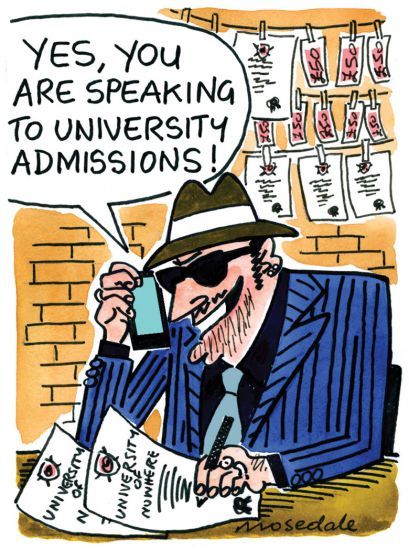
More than 30 bogus UK universities have been shut down in the past year, The Guardian reported on 2 August. Higher Education Degree Datacheck, which monitors fake degrees on behalf of the government, said that it had closed down 32 operators masquerading as genuine universities and had another 30 investigations in progress. Twenty-five of the 32 supposed higher education institutions had been based overseas. Jayne Rowley, HEDD’s director, told the newspaper that the government’s proposal to make it easier for new providers to gain degree awarding powers could make the problem much worse. “If the number [of universities] swells by several hundred it’s going to be easier for…bogus operators to get in under the radar,” she said.
If any more evidence of the march of marketisation into higher education was needed, it has arrived in the shape of the “buy-one-get-one free” degree. The University is Sheffield is offering students with three A grades at A level the chance of a free master’s course worth up to £10,000 if they first enrol on an undergraduate degree, the Sunday Times reported on 7 August. In what the newspaper said was “one of the biggest scrambles” for undergraduate recruitment in years, De Montfort University is offering applicants free tickets to watch Premier League champions Leicester City. How much longer can it be before UK university degrees are marketed with the offer of a free carriage clock, or perhaps a fountain pen, just for requesting a prospectus?
A 23-year-old University of Brighton fashion student who ran a social media campaign to convince young people to vote to leave the European Union was given £625,000 by the Vote Leave campaign, it has emerged. Darren Grimes’ campaign, BeLeave, managed to attract only 6,300 Facebook likes and just 3,700 Twitter followers, reported the Argus – working out at a pricey £62.50 per online fan. Mr Grimes told Buzzfeed that he had spent the money on a Canadian social media consultancy called AggregateIQ, whom he described as “data and social media experts”. As the economy stutters in the wake of the referendum, it is heartening to see that at least some businesses benefited as a result of the campaign.
The hygiene risks of “double-dipping” have finally been weighed up by science. Robert Shmerling, an associate professor at Harvard Medical School, reviews the literature and analyses the issue in an article for the Harvard Health Blog, finding one study that described how bacterial counts in dips surged “after a person took a bite from a crisp and then dipped again”, The Sunday Times reported on 7 August. The newspaper added that the original research also found that “salsa accumulated more germs than chocolate or cheese” – although anyone dipping a crisp in chocolate has problems beyond hygiene. The double-dip menace became a subject for party conversations and academic research after forming the subject of a Seinfeld episode, Dr Shmerling noted. He concluded that while it is “reasonable to discourage double dipping, it’s unlikely to pose a major risk to your health”.
Not all lecturers are happy about a new breed of studious undergraduates filling university libraries until midnight, it appears. “Students should be a bit naughty,” Willie Walters told the Evening Standard’s gossip column, The Londoner, on 5 August as she retired as course director of Central Saint Martins’ BA fashion course. “We’ve always loved those students who have been out partying all night and crawl into the studios like zombies in the morning,” admitted Walters, who is leaving the school, part of the University of the Arts, London, after 25 years’ service. “It’s all part of being a student, isn’t it?” she added.
The Guild of European Research Intensive Universities has called on Jo Johnson to guarantee Horizon 2020 funding for all UK scientists, even after the UK leaves the European Union (EU). “Over the past few weeks, evidence has been mounting that the UK’s referendum result on Brexit has begun to undermine collaborative research through a decline in joint funding applications involving UK partners,” it said. The organisation, whose UK members are the universities of Glasgow and Warwick, also urged the universities and science minister to guarantee Erasmus or Erasmus-equivalent funding for UK students beginning their degree programmes while the UK is still a member of the EU, and to guarantee “home fee levels” for all continuing EU students. In a statement released on 8 August, the guild said it is “equally important” that all EU member states guarantee existing fee levels for all UK students beginning their study while the UK is still a member of the EU.



